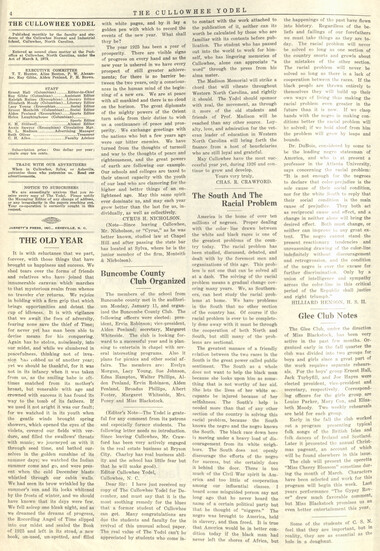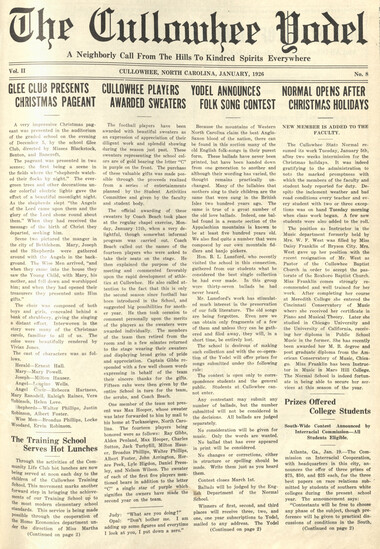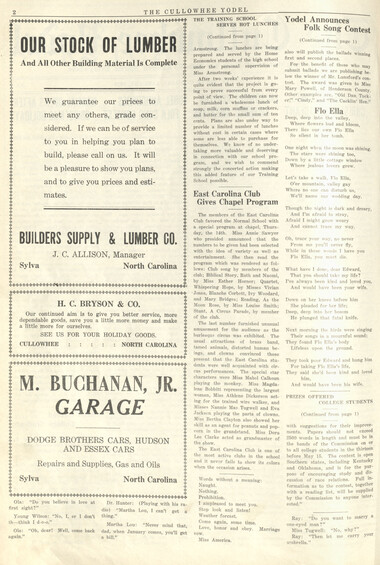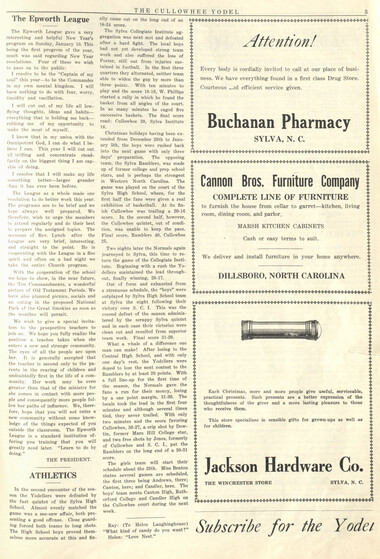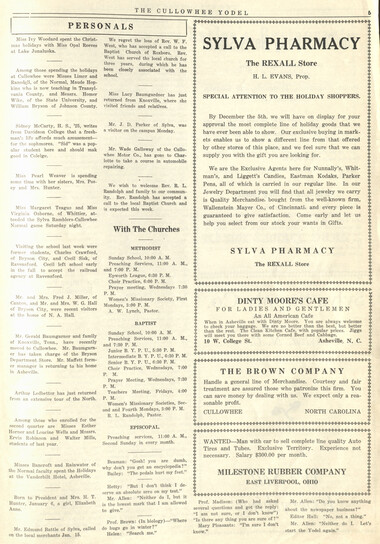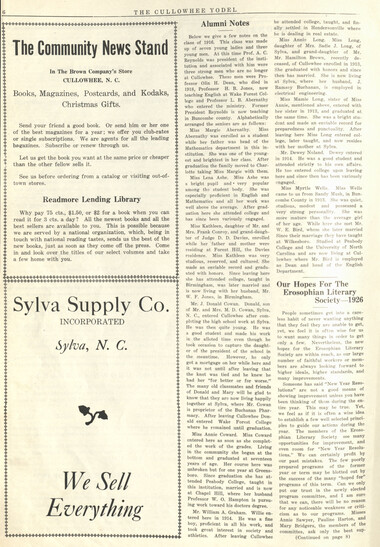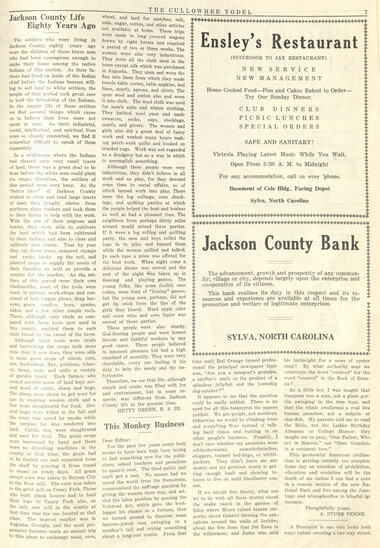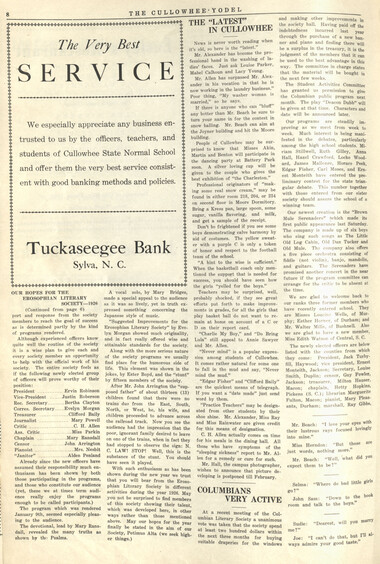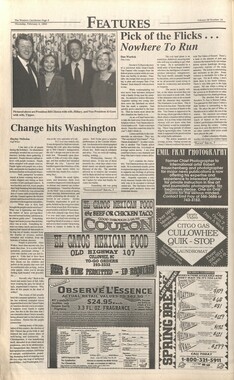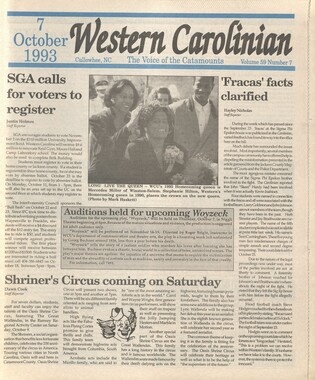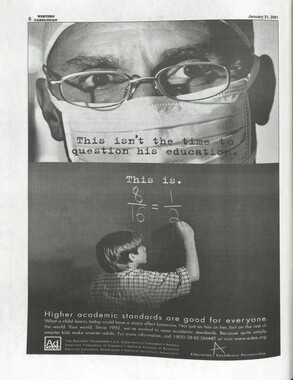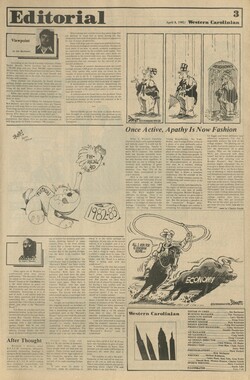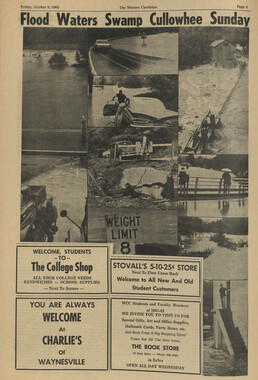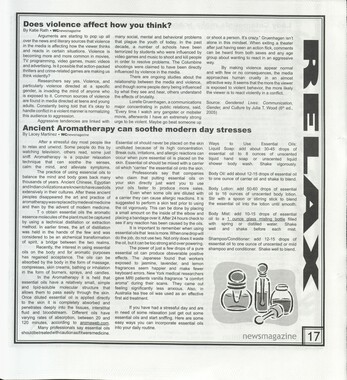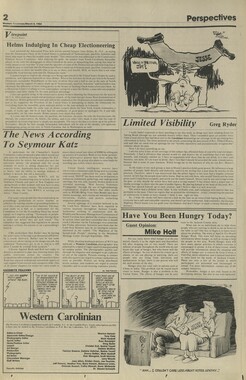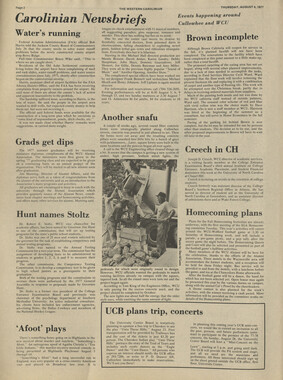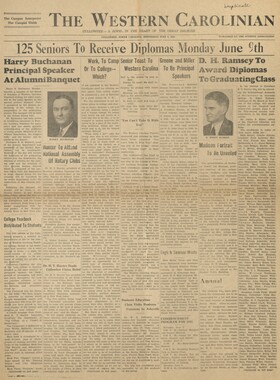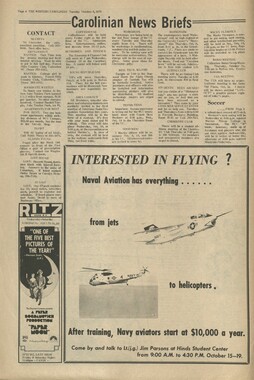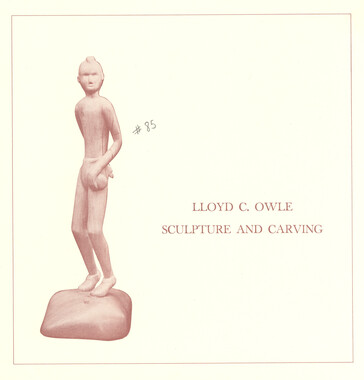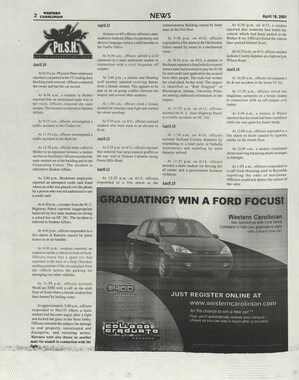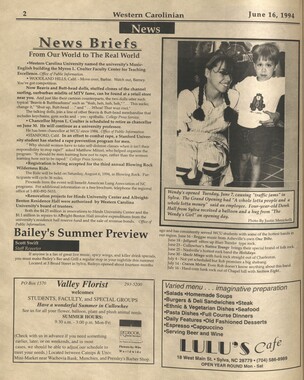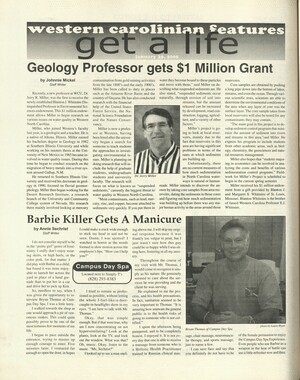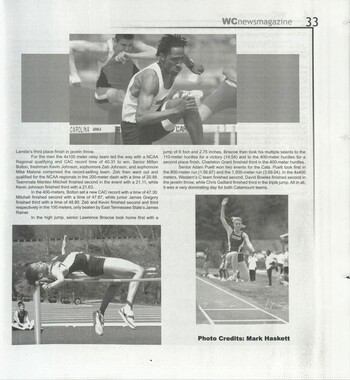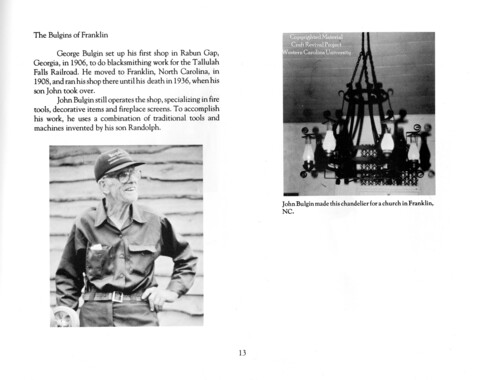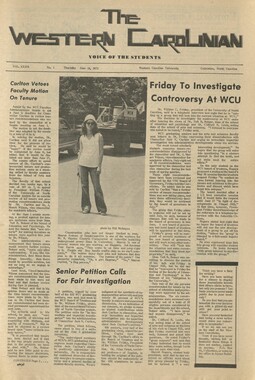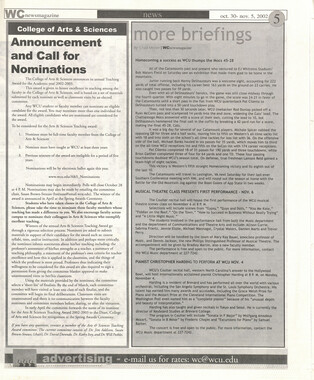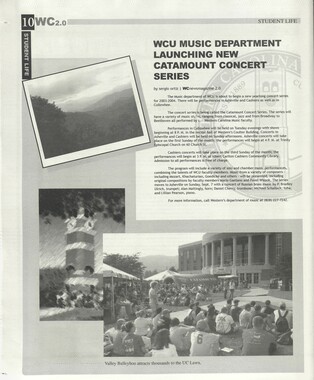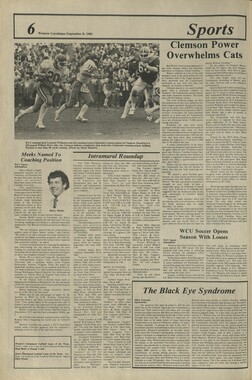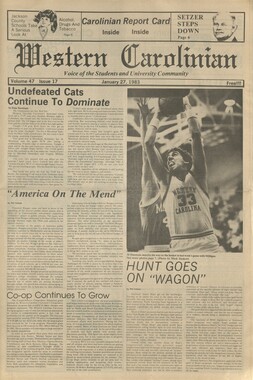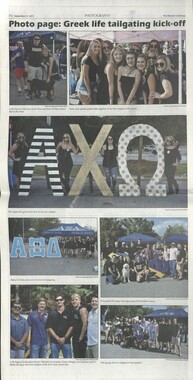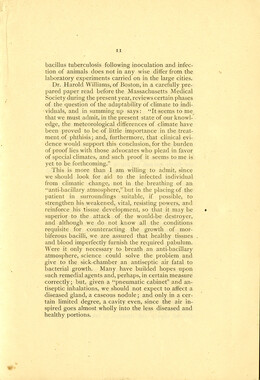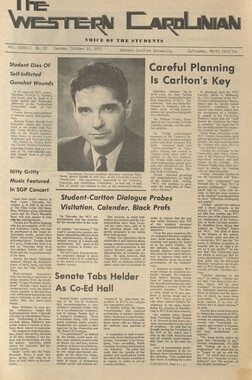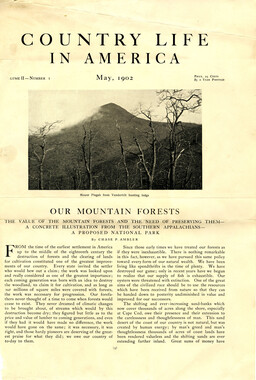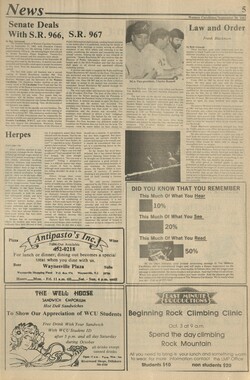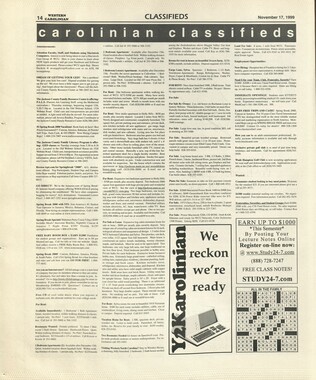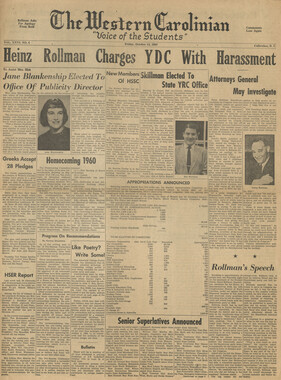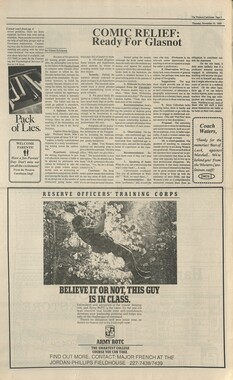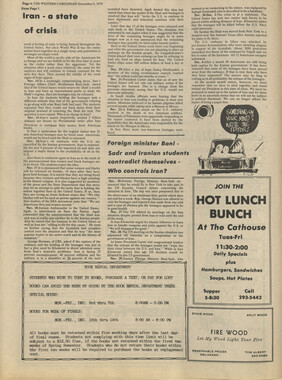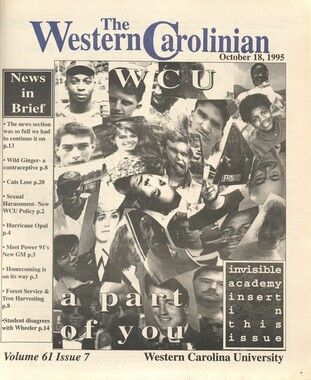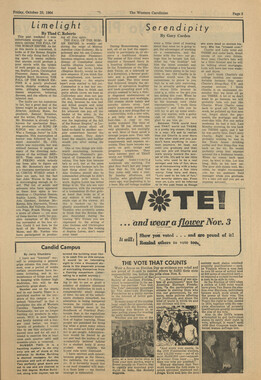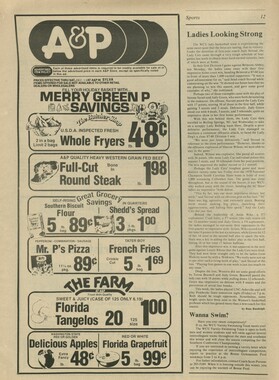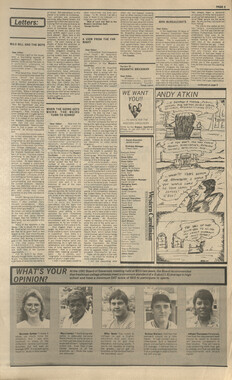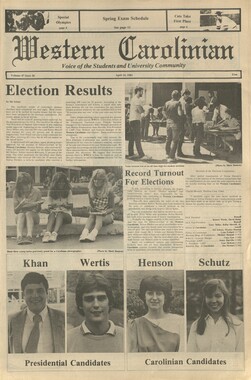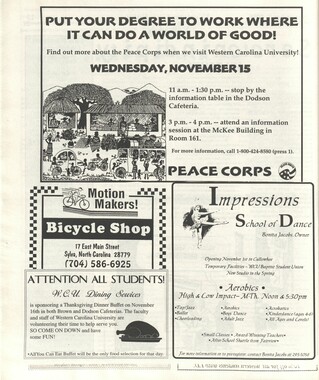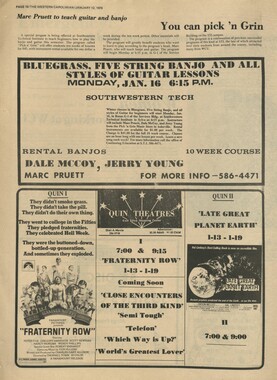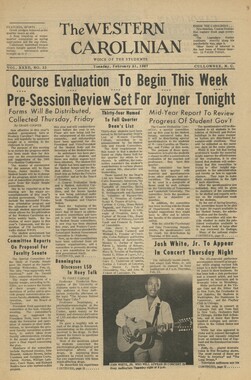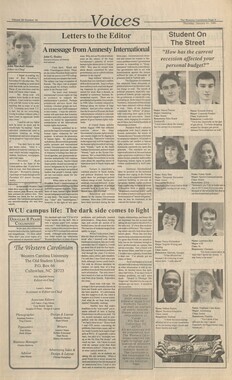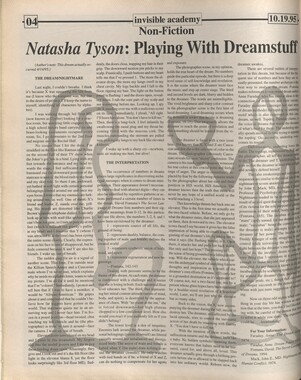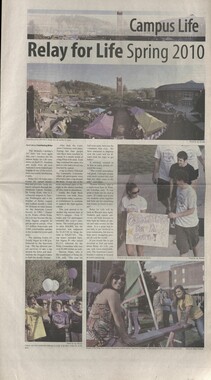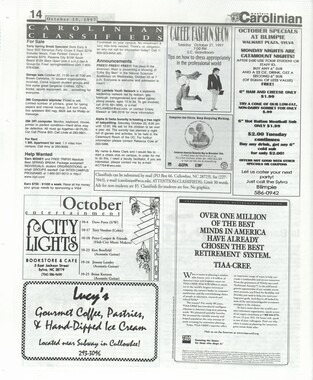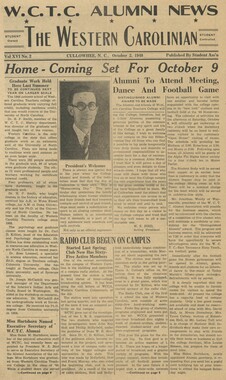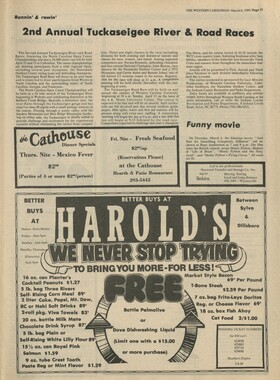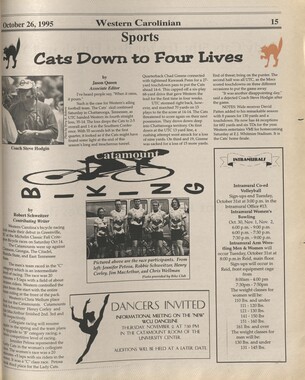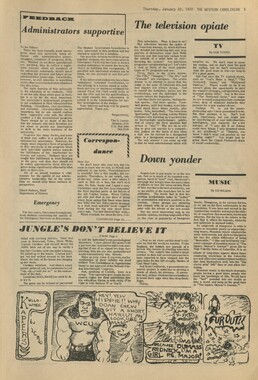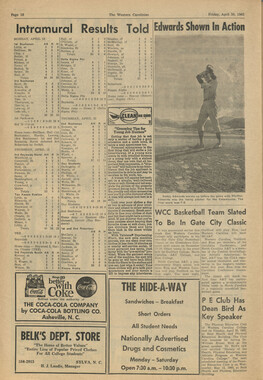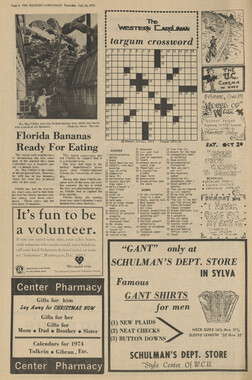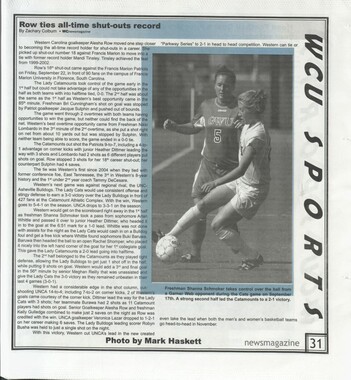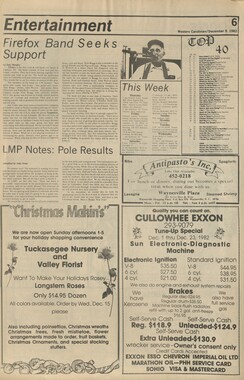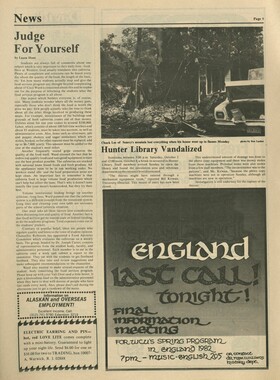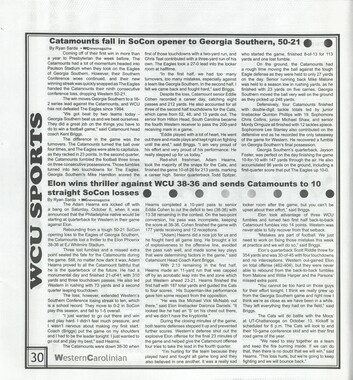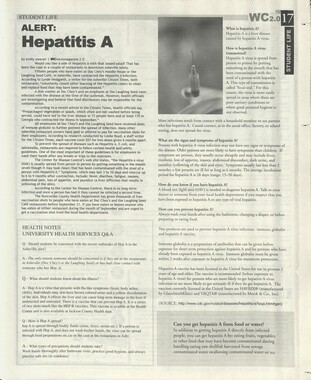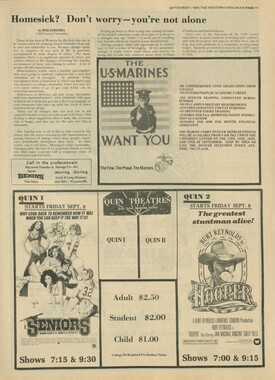Western Carolina University (21)
View all
- Canton Champion Fibre Company (2308)
- Cherokee Traditions (291)
- Civil War in Southern Appalachia (165)
- Craft Revival (1942)
- George Masa Collection (137)
- Great Smoky Mountains - A Park for America (3182)
- Highlights from Western Carolina University (422)
- Horace Kephart (998)
- Journeys Through Jackson (159)
- LGBTQIA+ Archive of Jackson County (90)
- Oral Histories of Western North Carolina (318)
- Picturing Appalachia (6617)
- Stories of Mountain Folk (413)
- Travel Western North Carolina (153)
- Western Carolina University Fine Art Museum Vitreograph Collection (129)
- Western Carolina University Herbarium (92)
- Western Carolina University: Making Memories (738)
- Western Carolina University Publications (2491)
- Western Carolina University Restricted Electronic Theses and Dissertations (146)
- Western North Carolina Regional Maps (71)
- World War II in Southern Appalachia (131)
University of North Carolina Asheville (6)
View all
- Allanstand Cottage Industries (62)
- Appalachian National Park Association (53)
- Bennett, Kelly, 1890-1974 (1463)
- Berry, Walter (76)
- Brasstown Carvers (40)
- Carver, George Washington, 1864?-1943 (26)
- Cathey, Joseph, 1803-1874 (1)
- Champion Fibre Company (233)
- Champion Paper and Fibre Company (297)
- Cherokee Indian Fair Association (16)
- Cherokee Language Program (22)
- Crowe, Amanda (40)
- Edmonston, Thomas Benton, 1842-1907 (7)
- Ensley, A. L. (Abraham Lincoln), 1865-1948 (275)
- Fromer, Irving Rhodes, 1913-1994 (70)
- George Butz (BFS 1907) (46)
- Goodrich, Frances Louisa (120)
- Grant, George Alexander, 1891-1964 (96)
- Heard, Marian Gladys (60)
- Kephart, Calvin, 1883-1969 (15)
- Kephart, Horace, 1862-1931 (313)
- Kephart, Laura, 1862-1954 (91)
- Laney, Gideon Thomas, 1889-1976 (439)
- Masa, George, 1881-1933 (61)
- McElhinney, William Julian, 1896-1953 (44)
- Niggli, Josephina, 1910-1983 (10)
- North Carolina Park Commission (105)
- Osborne, Kezia Stradley (9)
- Owens, Samuel Robert, 1918-1995 (11)
- Penland Weavers and Potters (36)
- Roberts, Vivienne (15)
- Roth, Albert, 1890-1974 (142)
- Schenck, Carl Alwin, 1868-1955 (1)
- Sherrill's Photography Studio (2565)
- Southern Highland Handicraft Guild (127)
- Southern Highlanders, Inc. (71)
- Stalcup, Jesse Bryson (46)
- Stearns, I. K. (213)
- Thompson, James Edward, 1880-1976 (226)
- United States. Indian Arts and Crafts Board (130)
- USFS (683)
- Vance, Zebulon Baird, 1830-1894 (1)
- Weaver, Zebulon, 1872-1948 (58)
- Western Carolina College (230)
- Western Carolina Teachers College (282)
- Western Carolina University (2008)
- Western Carolina University. Mountain Heritage Center (18)
- Whitman, Walt, 1819-1892 (10)
- Wilburn, Hiram Coleman, 1880-1967 (73)
- Williams, Isadora (3)
- Cain, Doreyl Ammons (0)
- Crittenden, Lorraine (0)
- Rhodes, Judy (0)
- Smith, Edward Clark (0)
- Appalachian Region, Southern (3032)
- Asheville (N.C.) (1945)
- Avery County (N.C.) (26)
- Blount County (Tenn.) (200)
- Buncombe County (N.C.) (1680)
- Cherokee County (N.C.) (283)
- Clay County (N.C.) (556)
- Graham County (N.C.) (247)
- Great Smoky Mountains National Park (N.C. and Tenn.) (535)
- Haywood County (N.C.) (3573)
- Henderson County (N.C.) (70)
- Jackson County (N.C.) (4926)
- Knox County (Tenn.) (61)
- Knoxville (Tenn.) (21)
- Lake Santeetlah (N.C.) (14)
- Macon County (N.C.) (421)
- Madison County (N.C.) (216)
- McDowell County (N.C.) (39)
- Mitchell County (N.C.) (135)
- Polk County (N.C.) (35)
- Qualla Boundary (982)
- Rutherford County (N.C.) (78)
- Swain County (N.C.) (2187)
- Transylvania County (N.C.) (270)
- Watauga County (N.C.) (12)
- Waynesville (N.C.) (86)
- Yancey County (N.C.) (72)
- Aerial Photographs (3)
- Aerial Views (60)
- Albums (books) (4)
- Articles (1)
- Artifacts (object Genre) (228)
- Bibliographies (1)
- Biography (general Genre) (2)
- Cards (information Artifacts) (38)
- Clippings (information Artifacts) (193)
- Copybooks (instructional Materials) (3)
- Crafts (art Genres) (622)
- Depictions (visual Works) (21)
- Design Drawings (1)
- Digital Moving Image Formats (2)
- Drawings (visual Works) (185)
- Envelopes (115)
- Exhibitions (events) (1)
- Facsimiles (reproductions) (1)
- Fiction (general Genre) (4)
- Financial Records (12)
- Fliers (printed Matter) (67)
- Glass Plate Negatives (381)
- Guidebooks (2)
- Internegatives (10)
- Interviews (823)
- Land Surveys (102)
- Letters (correspondence) (1070)
- Manuscripts (documents) (618)
- Maps (documents) (177)
- Memorandums (25)
- Minutes (administrative Records) (59)
- Negatives (photographs) (6192)
- Newsletters (1290)
- Newspapers (2)
- Notebooks (8)
- Occupation Currency (1)
- Paintings (visual Works) (1)
- Pen And Ink Drawings (1)
- Periodicals (194)
- Personal Narratives (10)
- Photographs (12977)
- Plans (maps) (1)
- Poetry (6)
- Portraits (4573)
- Postcards (329)
- Programs (documents) (181)
- Publications (documents) (2444)
- Questionnaires (65)
- Relief Prints (26)
- Sayings (literary Genre) (1)
- Scrapbooks (282)
- Sheet Music (2)
- Slides (photographs) (402)
- Songs (musical Compositions) (2)
- Sound Recordings (802)
- Specimens (92)
- Speeches (documents) (18)
- Tintypes (photographs) (8)
- Transcripts (329)
- Text Messages (0)
- A.L. Ensley Collection (275)
- Appalachian Industrial School Records (7)
- Appalachian National Park Association Records (336)
- Axley-Meroney Collection (2)
- Bayard Wootten Photograph Collection (20)
- Bethel Rural Community Organization Collection (7)
- Blumer Collection (5)
- C.W. Slagle Collection (20)
- Canton Area Historical Museum (2110)
- Carlos C. Campbell Collection (564)
- Cataloochee History Project (64)
- Cherokee Studies Collection (4)
- Daisy Dame Photograph Album (5)
- Daniel Boone VI Collection (1)
- Doris Ulmann Photograph Collection (112)
- Elizabeth H. Lasley Collection (1)
- Elizabeth Woolworth Szold Fleharty Collection (4)
- Frank Fry Collection (95)
- George Masa Collection (173)
- Gideon Laney Collection (452)
- Hazel Scarborough Collection (2)
- Hiram C. Wilburn Papers (28)
- Historic Photographs Collection (236)
- Horace Kephart Collection (861)
- Humbard Collection (33)
- Hunter and Weaver Families Collection (1)
- I. D. Blumenthal Collection (4)
- Isadora Williams Collection (4)
- Jesse Bryson Stalcup Collection (47)
- Jim Thompson Collection (224)
- John B. Battle Collection (7)
- John C. Campbell Folk School Records (80)
- John Parris Collection (6)
- Judaculla Rock project (2)
- Kelly Bennett Collection (1482)
- Love Family Papers (11)
- Major Wiley Parris Civil War Letters (3)
- Map Collection (12)
- McFee-Misemer Civil War Letters (34)
- Mountain Heritage Center Collection (4)
- Norburn - Robertson - Thomson Families Collection (44)
- Pauline Hood Collection (7)
- Pre-Guild Collection (2)
- Qualla Arts and Crafts Mutual Collection (12)
- R.A. Romanes Collection (681)
- Rosser H. Taylor Collection (1)
- Samuel Robert Owens Collection (94)
- Sara Madison Collection (144)
- Sherrill Studio Photo Collection (2558)
- Smoky Mountains Hiking Club Collection (616)
- Stories of Mountain Folk - Radio Programs (374)
- The Reporter, Western Carolina University (510)
- Venoy and Elizabeth Reed Collection (16)
- WCU Gender and Sexuality Oral History Project (36)
- WCU Mountain Heritage Center Oral Histories (25)
- WCU Oral History Collection - Mountain People, Mountain Lives (71)
- WCU Students Newspapers Collection (1923)
- Western North Carolina Tomorrow Black Oral History Project (69)
- William Williams Stringfield Collection (2)
- Zebulon Weaver Collection (109)
- African Americans (390)
- Appalachian Trail (35)
- Artisans (521)
- Cherokee art (84)
- Cherokee artists -- North Carolina (10)
- Cherokee language (21)
- Cherokee pottery (101)
- Cherokee women (208)
- Church buildings (190)
- Civilian Conservation Corps (U.S.) (114)
- College student newspapers and periodicals (2012)
- Dams (115)
- Dance (1023)
- Education (222)
- Floods (63)
- Folk music (1015)
- Forced removal, 1813-1903 (2)
- Forest conservation (220)
- Forests and forestry (1198)
- Gender nonconformity (4)
- Great Smoky Mountains National Park (N.C. and Tenn.) (181)
- Hunting (47)
- Landscape photography (25)
- Logging (122)
- Maps (83)
- Mines and mineral resources (9)
- North Carolina -- Maps (18)
- Paper industry (38)
- Postcards (255)
- Pottery (135)
- Railroad trains (72)
- Rural electrification -- North Carolina, Western (3)
- School integration -- Southern States (2)
- Segregation -- North Carolina, Western (5)
- Slavery (5)
- Sports (452)
- Storytelling (243)
- Waterfalls -- Great Smoky Mountains (N.C. and Tenn.) (66)
- Weaving -- Appalachian Region, Southern (280)
- Wood-carving -- Appalachian Region, Southern (328)
- World War, 1939-1945 (174)
Cullowhee Yodel Volume 02 Number 08
Item
Item’s are ‘child’ level descriptions to ‘parent’ objects, (e.g. one page of a whole book).
-
-
THE CULLOWHEE YODEL THE CULLOWHEE YODEL Published monthly by the faculty and students of the Cullowhee Normal and Industrial School, Cullowhee, North Carolina. Entered as second class matter at the Post- office at Cullowhee, North Carolina, under the Act of March 3. 1879. EXECUTIVE COMMITTEE T. T. Hunter, Alice Benton, P. W. Alexander, Ray Gibbs, Alden Penland, F. H. Brown. STAFF Ernest Hall (Columbian) Editor-in-Chief Ray Gibbs (Columbian) Assistant Editor Raleigh Raines (Erosophian)—Literary Editor Elizabeth Moody (Columbian)__Literary Editor Lacy YounK (Erosophian Social Editor Ernest Monteith (Columbian)___Social Editor Alden Penland (Erosophian) Sports Editor Helen Lauprhinghouse (Columbian) E. H." StfllwelLlV. "7."".""".""Alumni Editor Annie Sawyer (Erosophian) Circulation Mgr. R. L. Madison Advertising Manager Ruth Oliver Treasurer C. H. Allen Faculty Advisor TRADE WITH OUR ADVERTISERS When in Cullowhee, Sylva, or Asheville, patronize those who patronize us. Read our NOTICE TO SUBSCRIBERS We are exceedingly anxious that you receive every copy of The Yodel. Please notify the Managing Editor of any change of address, Your co-operation is earnestly sought in this THE OLD YEAR It is with reluctance that we part, forever, with those things that have brought us happiness and success. We shed tears over the forms of friends and relatives who have joined that innumerable caravan which marches to that mysterious realm from whence no traveler e'er returns. We rejoice in holding with a firm grip that which brings opportunities and detest the cup of idleness. It is with vigilance that we await the foes of adversity, fearing none save the thief of Time; for never yet has man been able to devise means for his conquering. Again has he stolen, noiselessly, into our midst, and while we slumbered in peacefulness, thinking not of invasion V.a., robbed us of another year; yet we should be thankful, for it was not in its infancy when it was taken from us, as the smiling babe is oft- times snatched from its mother's breast, but venerable with age and crowned with success it has found its way to the tomb of its fathers. If we used it not aright it was our fault; for we watched it in its youth when the gentle winds brought spring showers, which opened the eyes of the violets, covered our fields with verdure, and filled the swallows' throats with music; we journeyed on with it through seed time, and bathed ourselves in the golden sunshine of its r days; we watched the Indian • come and go, and were present when the cold December blasts whistled through our cabin walls. We had seen its brow wrinkled by the summer's sun and its locks whitened by the frosts of winter, and we should have known that its days were few. We fell asleep one bleak night, and as we dreamed the dreams of progress, the Recording Angel of Time slipped into our midst and sealed the Book of 1925 and left in its stead, a new book, un-used, un-spotted, and filled with white pages, and by it lay a golden pen with which to record the events of the new year. What shall they be? The year 1925 has been a year of prosperity. There are visible signs of progress on every hand and as the new year is ushered in we have every prospect of still greater achievements; for there is no barrier between the two years, only a consciousness in the human mind of the beginning of a new era. We are at peace with all mankind and there is no cloud on the horizon. The great diplomats of the mighty powers of the Orient turn aside from their duties to wish us a continuance of peace and prosperity. We exchange greetings with the nations who but a few years ago were our bitter enemies. We have turned from the thoughts of turmoil and war to the thoughts of peace and righteousness, and the great powers of earth are following our example. Our schools and colleges are taxed to their utmost capacity with the youth of our land who are clamoring for the higher and better things of an enlightened age. May this same spirit ever dominate us, and may each year grow better than the last for us, individually, as well as collectively. CYRUS H. NICHOLSON. (Note—Since leaving Cullowhee, Mr. Nicholson, or "Cyrus," as he was better known, studied law at Chapel Hill and after passing the state bar has located at Sylva, where he is the junior member of the firm, Monteitb & Nicholson). to contact with the work attached to the publication of it, neither can its worth be calculated by those who are familiar with its contents before publication. The student who has passed out into the world to work for himself, who has lingering memories of Cullowhee, alone can appreciate "a word" through the press from his alma mater. The Madison Memorial will strike a chord that will vibrate throughout Western North Carolina, and rightly it should. The Yodel should sponsor with zeal, the movement, as through it more of the old students and friends of Prof. Madison will be reached than any other source. Loy alty, love, and admiration for the veteran leader of education in Western North Carolina will bring forth the finance from a host of beneficiaries who are still loyal and grateful. May Cullowhee have the most successful year yet, during 1926 and eon tinue to grow and develop. Yours vary truly, CHAS. R. CRAWFORD. Buncombe County Club Organized The members of the school from Buncombe county met in the auditorium Monday, January 11, and organized the Buncombe County Club. The following officers were elected: president, Ervin Robinson; vice-president, Alden Penland; secretary, Margaret Whiteside. The club is looking forward to a successful year and is planning to entertain in chapel with several interesting programs. Also it plans for picnics and other social affairs. The members are: Evelyn Morgan, Lacy Young, Sue Johnson, Edna Hampton, Walter Phillips, Alden Penland, Ervin Robinson, Alden Penland, Broadus Phillips, Albert Foster, Margaret Whiteside, Mrs. Posey and Miss Blackstock. (Editor's Note—The Yodel is grateful for any comment from its patrons and especially former students. The following letter needs no introduction. Since leaving Cullowhee, Mr. Crawford has been very actively engaged in the real estate business at Bryson City. Charley has real business ability and the school has little fear but that he will make good). Editor Cullowhee Yodel, Cullowhee, N. C. Dear Sir: I have just received my copy of The Cullowhee Yodel for December, and must say that it is the most soothing remedy for the blues that a former student of Cullowhee can get. Many congratulations are due the students and faculty for the revival of this unusual school paper. The real value of The Yodel can't be appreciated by students who come in- The South And The Racial Problem America is the home of over ten millions of negroes. Proper dealing with the color- line drawn between the white and black races is one of the greatest problems of the country today. The racial problem has been studied, discussed, debated, and dealt with by the foremost men and organizations of this age. This problem is not one that can be solved all at a dash. The solving of the racial problem means a gradual change covering many years. We, as Southerners, can best study the racial problems at home. We have problems in the South that no other section of the country has. Of course it' the racial problem is ever to be completely dime away with it must be through the cooperation of both North and South, but still many of the problems are sectional. The greatest manace of a friendly relation between the two races in the South is the great power called public sentiment. The South as a whole does not want to help the black man because she looks upon him as something that is not worthy of her aid. She lets the lives of her white occupants be injured because of her selfishness. The South's help is needed more than that of any other section of the country in solving this racial problem, because the South knows the negro and the negro knows the South. The black race down here Is moving under a heavy load of discouragement from its white neighbors. The South does not openly discourage the efforts of the negro for success, but she certainly does it behind the door. There is too much of the Civil War spirit in America and too little of cooperation among our influential classes. I heard some misguided person say not long ago that he never heard the name of a certain political party but that he thought of "niggers." The negro was brought to America, held in slavery, and then freed. It is true that America would be in better condition today if the black man had never left the shores of Africa, but the happenings of thy past have flown into history. Regardless of the beliefs and failings of our forefathers we must take things as they are today. The racial problem will never be solved so long as one section of the country snorts and growls about the mistakes of the other section. The racial problem will never be solved BO long as there is a lack of cooperation between the races. If the black people are thrown entirely to themselves they will build up their own ways i f living thus making the racial problem even greater in the future than it is now. If we clasp hands with the negro in making conditions better the racial problem will be solved; if we hold aloof from him the problem will grow by leaps and bounds. Dr. DnBois, c< t idered by some to be the leading negro statesman of America, and who is at present a professor in the Atlanta University, says concerning the racial problem: "It. is not enough for the negroes to declare that color-prejudice is the sole cause of their social condition, nor for the white it h to reply that their social condition is the main cause of prejudice They both act as reciprocal cause and effect, and a change in neither alone will bring the desired effect. Both must change, or neither can Improvi to any great extent. The negro cannot stand the present reactionary tendencies and unreasoning drawing of the color-line indefinitely without discouragement and retrogression, and the condition of the negro is ever the excuse for further discrimination. Only by a union of intelligence and sympathy color line in this critical period of the R< p bli ihall justice and right triumph." BILLIARD HEN ION, H. S. IL Glee Club Notes The Glee Club, under the direction of Miss Blackstock. has been very active in the past few months. Or- ir.'.ni/.e.l early in the fall quarter the club mi divided into two groups for boys and girls since a great part of the work requires separate rehearsals. For ths boys' group Ernest Hall, Jack Turbyfill, and Joe Hayes were elected president, vice-president and secretary, respectively. Corresponding officers for the girls group are Louise Parker, Mary Cox, and Elizabeth Moody. Two weekly rehearsals are held for each group. Early in the fall the club worked out a program presenting typical folk songs of the British Isles and folk dances of Ireland and Scotland. Later it presented ths annual Christmas pageant, an account of which will be found elsewhere in this issue. The club will present the operetta "Miss Cherry Blossom" sometime during the month of March. Characters have been selected and work for this program will begin this week. Last years performance "The Gypsy Rover" drew much favorable comment, but Miss Blackstock promises us an even better entertainment this year. Some of the students of C. S. N. feel that they are important, but in reality, they are as essential as the hole in a doughnut.
Object
Object’s are ‘parent’ level descriptions to ‘children’ items, (e.g. a book with pages).
-
The Western Carolinian is Western Carolina University’s student-run newspaper. The paper was published as the Cullowhee Yodel from 1924 to 1931 before changing its name to The Western Carolinian in 1933.
-
